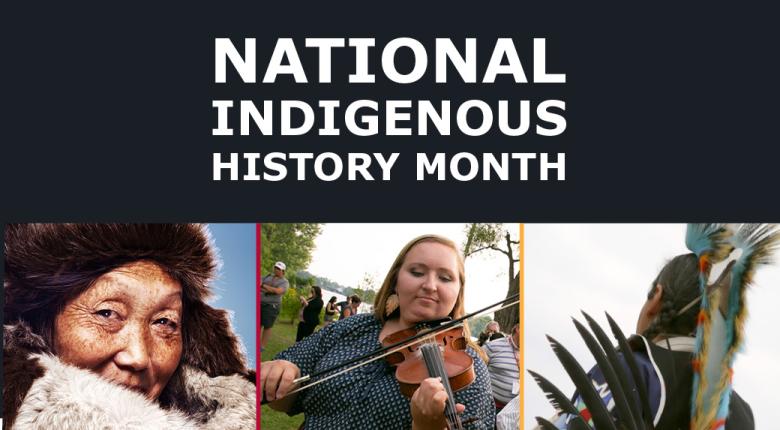
National Indigenous History Month:
June is National Indigenous History Month. It's a time for everyone - Indigenous, non-Indigenous and newcomers - to reflect upon and learn the history, sacrifices, cultures, contributions, and strength of First Nations, Inuit and Metis people. It’s important to keep in mind that First Nations, Inuit and Métis Peoples each have their own unique histories. And within each group, there are distinct histories.
Throughout the month of June, Indigenous Student Services will be sharing daily facts and resources on social media, weekly film suggestions, and a virtual workshop for all students, faculty and staff.
Things to know this week:
Monday June 5:
Métis music reflects their mixed ancestry and therefore comprises an amalgam of music styles, languages, and socio-cultural elements.
The Red River Jig is a proper name attributed to both the Canadian Métis and the First Nations, in reference to a traditional dance and accompanying fiddle tune. The dance’s performers and fiddlers currently and historically includes individuals identifying as First Nations, French Canadian, or Scottish Canadians, as well as others involved in the expansive 19th century fur trade.
"Jigging", as commonly referred to by the Métis people, has observable similarities to the traditional dances of Quebec and the Canadian Maritime communities of British Isles heritage.
Learn to Metis Jig:
Tuesday June 6:
Haudenosaunee, Rotinonshonni, Hodenoshonni, are just a few of many days to express the collective identity of the Seneca, Cayuga, Onondaga, Oneida, Mohawk and the Tuscarora Nations. Haudenosaunee is the most used form, meaning “People Who Build Longhouses.” The bark covered longhouse could be extended as the families grew. The longest such house was over 450 feet long, dating from about 1550.
However, those nation names are not actually Haudenosaunee names. The nations refer to themselves as follows:
-
Onöndowagá, Seneca: People of the Big Hill
-
Gayogoho:nǫ, Cayuga: People of the Swamp
-
Onodagegá, Onondaga: People of the Hills
-
Onʌyota’a, Oneida: People of the Standing Stone
-
Kanien’keha:ka, Mohawk: People of the Flint
-
Skaru:rę, Tuscarora: People of the Shirt
Watch: The Longhouse People (1951, 23mins)
Wednesday June 7:
Inuit games serve to keep people mentally tough and physically healthy. The games help build strength, cultivate endurance and develop agility.
Pushing and pulling games focus on developing strength in different parts of the body in preparation for hunting. Many games require a competitor and are useful not only in building strength, but in identifying the strongest hunters and in creating community bonds.
These games include the knuckle hop, airplane planking, foot racing and various hopping games. Each game requires balance and control and some closely mimic the skills necessary to be a successful hunter.
Inuit Games Video Podcast:
Thursday June 8:
What is a reserve?
A reserve is land set apart and designated for the use and occupancy of members of a First Nation. Reserves should not be confused with land claims areas, which involve all of that First Nation’s traditional lands — a much larger territory than reserve land.
How many reserves are there in Canada?
There are 3,100 reserves across Canada
Six Nations of The Grand River is the largest reserve in Canada, with over 27,000 members.
For more information, visit First Nation Profiles Interactive Map
Friday June 9:
Film: The Angry Inuk (2016)
In her award-winning documentary, director Alethea Arnaquq-Baril joins a new tech-savvy generation of Inuit as they campaign to challenge long-established perceptions of seal hunting. Armed with social media and their own sense of humour and justice, this group is bringing its own voice into the conversation and presenting themselves to the world as a modern people in dire need of a sustainable economy.
Watch: The Angry Inuk (82 min)
To continue to learn more about National Indigenous History Month:
Like us on Facebook: IESS Facebook
Follow us on Twitter: IESS Twitter
Questions? Contact Indigenous Awareness Programmer:
Amanda Aitchison
Phone: 905-575-1212 x4318
Email: amanda.aitchison2 [at] mohawkcollege.ca (amanda[dot]aitchison2[at]mohawkcollege[dot]ca)

